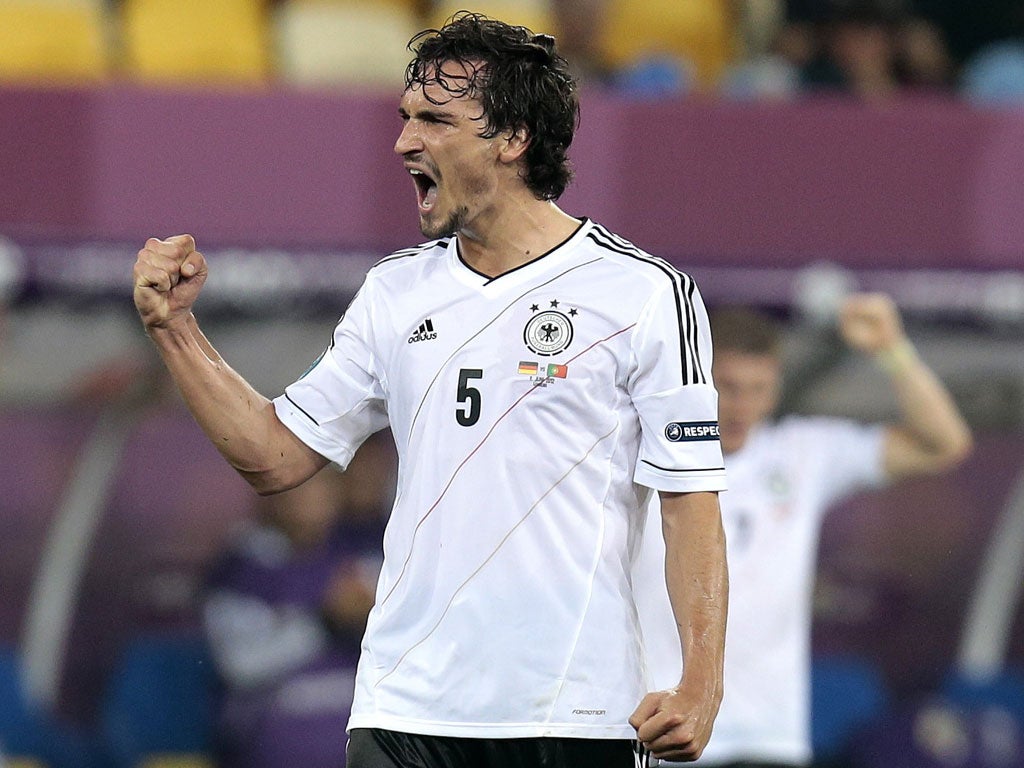Germany defender Mats Hummels knows history fuels great expectations at Euro 2012
Defender tells Tim Rich Germany's young squad expect a difficult match against Greece tonight

Next to the podium from which the Germany team give press conferences stands a Mercedes – not the ostentatious kind but a sleeker, smaller sort, alongside the slogan "A Heartbeat for a New Generation".
You could say the same of the football team. If you check the forenames of Joachim Löw's squad, there are a couple of Marios, a Mesut, a Miroslav and a Lars; by turns Italian, Turkish, Polish and Swedish. Fabio Capello tried to make the point after the 4-1 humbling England suffered in Bloemfontein two years ago – that this was not a "proper" German team. What he meant was that Löw's was a "different" German side. Certainly, it feels different to the stiffly hierarchical squads, dominated by Lothar Matthäus or Stefan Effenberg, who muscled through so many tournaments without anyone falling in love with their football.
"We grew up together," says Mats Hummels, the 23-year-old Borussia Dortmund defender, when we meet at the Germany base this week. "I have known many of them for four or five years so it feels more like a family. It is different because we don't have so many senior players. Only Miroslav Klose is over 30 and even our captain, Philipp Lahm, is 28."
Six members of this side were in the Under-21 team that destroyed England 4-0 in the final of the European Under-21 Championship in Malmo in 2009. Roy Hodgson can call on James Milner and Theo Walcott; Joe Hart would have played but for suspension.
Hummels, however, said the gulf between Germany and England might be narrower than many imagine.
He said: "English football has just won the Champions League, surely that's OK? In 2010 it was down to Frank Lampard's 'goal'. If it had counted, Germany would have had a problem. It was good for us because it let us play on the counter-attack but you can't say Germany is better than England. If that goal had counted, maybe England would have gone on to win. It's just the details."
Löw is good on details. Hummels said the manager is not a man to lose his temper, even after a 5-3 defeat by Switzerland before Euro 2012: "If he thought we didn't want to run or want to win, then there would be trouble. But it wasn't motivation that was the problem against the Swiss, it was the formation."
In South Africa two years ago, Löw took his squad on safari and to Robben Island, where Nelson Mandela had been imprisoned. This week the squad went mountain biking and toured the city that is still known in Germany as Danzig.
"It can be a bit boring in the hotel," said Hummels. "I have a lot of books with me. There's Steve Jobs's autobiography, and some German authors. We play cards, snooker and go on the internet. I've just been playing table tennis – I lost, God knows how. It's better than just sitting in your room and thinking about football. If you do that, you can get a bit weird about it."
One of the books the German Football Association has made available in its press centre is a 250-page volume called Danzig Identities, about what the city means to Poles and Germans. There is a chapter that tells how Danzig, which between the wars was a "free city" – German but not part of the Reich – kept the kindertransporte that ferried Jewish children to England going until a week before the Wehrmacht moved in.
Another chapter opens in the last week of March 1945. "A cold wind blew through the old town, the clocks had stopped and the tram bells no longer sounded. Only the seagulls kept screeching." Danzig became Gdansk.On Wednesday, the head of the German FA, Wolfgang Niersbach, visited the Westerplatte Memorial that stands where the battleship Schleswig-Holstein fired the opening shots of the Second World War.
A more modern crisis looms over tonight's quarter-final against Greece. Those at Greek base camp in Legionowo, near Warsaw, have noted how few Greek journalists are present – few papers can afford to send correspondents to Poland. The presence of the German chancellor, Angela Merkel, at the "Debt Derby" might be seen as inflammatory in Athens.
Hummels' response – "surely it is only a game?" – is the only reasonable one a footballer can give.
Half a dozen Greek players, however, have links with Germany. Kyriakos Papadopoulos plays for Schalke, Sokratis Papastathopoulos plays for Werder Bremen and Konstantinos Fortounis is with Kaiserslautern. The Olympiakos defender Jose Holebas was born in Aschaffenburg in Bavaria and has spent most of his life in Germany.
"It could be like the Champions League final between Bayern and Chelsea," said Hummels. "They will be very defensive and try to make their counter-attacks with corners and free-kicks. We are the favourites and we'll have plenty of the ball but it's important that we are not as slow as we were in the second half against Denmark."
There has been criticism. Germany have reached the finals of World Cup 2002 and Euro 2008 and finished third at the World Cups of 2006 and 2010. But they have not won.
"The criticism isn't always so wrong," said Hummels. "We needed some luck against Portugal and again against Denmark and we had a serious situation against Holland when Robin van Persie could have scored in the first seven minutes. But we know what [the public] expect and they expect the title."
Join our commenting forum
Join thought-provoking conversations, follow other Independent readers and see their replies
Comments
Bookmark popover
Removed from bookmarks